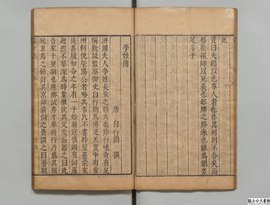
The Tale of Li Wa (traditional Chinese: 李娃傳; simplified Chinese: 李娃传; pinyin: Lǐ Wá Zhuàn; Wade–Giles: Li Wa Chuan) is a short novella by Chinese writer Bai Xingjian (or Bo Xingjian) during the Tang dynasty.
Song Geng (C: 宋耕, P: Sòng Gēng) wrote that this was one of three Tang dynasty works that were "particularly influential in the development of the caizi-jiaren model".[1] There is a poem by Yuan Zhen, "The Ballad of Li Wa," that is a companion to the novel.[2]
It was translated into English by Arthur Waley, who used the title The Story of Miss Li and included it on pages 113–36 in the collection More Translations from the Chinese, which was published in 1919 by Alfred A. Knopf.[3] It was also translated into English by Glen Dudbridge, who used the title The Tale of Li Wa: Study and Critical Edition of a Chinese Story from the Ninth Century.[4] This version was published in 1983 by Ithaca Press.[5]
The story was also translated in Wang Chi-chen, Traditional Chinese Tales (New York: Greenwood, 1944, 1976), pp. 61–74.
Linda Rui Feng of the University of Toronto wrote that the novel features the "unpredictability and unintelligibility" of Chang'an and a conflict between "career accomplishment" and "youthful transgressions".[2]
- ^ Song, Geng. The Fragile Scholar: Power and Masculinity in Chinese Culture. Hong Kong University Press, January 1, 2004. ISBN 9622096204, 9789622096202, p. 23-24
- ^ a b Feng, p. 40.
- ^ Nienhauser, "Introduction," p. xv.
- ^ Chan, Tak-hung Leo. The Discourse on Foxes and Ghosts: Ji Yun and the Eighteenth-century Literati Storytelling. University of Hawaii Press, 1998. ISBN 0824820517, 9780824820510. p. 46.
- ^ Nienhauser, "Introduction," p. xix.